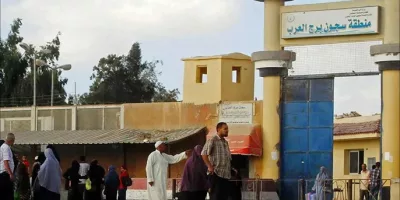The spike in Covid-19 infections in Egyptian prisons between March 2020 and August 2021 indicates Egypt’s failure to confront the pandemic in its detention facilities, despite the abusive measures it has imposed on detainees under the pretext of combating the spread of the virus.
In CFJ’s third thematic report for the year 2021, part of its Detention Watch project and entitled “Egyptian prisons during the pandemic (2020-2021)”, the organization shed light on the measures taken by Egyptian prisons during the period of the spread of the Covid -9 virus.
The organization relied on the guidelines issued by the World Health Organization in March 2020, which targets those responsible for the penal system and health authorities within countries in order to deal with the pandemic in prisons and places of detention. People deprived of their liberty are among the groups most vulnerable to infection with the virus, and those most affected by its complications due to the prevailing overcrowding in a large number of prisons, the difficulty of following the rules of social distancing most of the time, and the poor conditions of detention in some headquarters in general.
CFJ said in its report that the Egyptian Ministry of Interior, during the pandemic, only resorted to suspending visits to all prisons from 10/3/2020 to 19/3/2020 as its precautionary measure to confront the virus. The suspension was extended for successive times until it extended to five months. This procedure was followed by stopping the transfer of prisoners in pretrial detention to courts to attend interrogation sessions, and the renewal of pretrial detention on paper, exacerbating the isolation of detainees. With the beginning of the vaccination campaign, the Assistant Minister of Interior for Prisons announced in May 2021 that the Ministry of Interior was close to vaccinating all prison inmates with the first dose of the Covid-19 vaccine, claiming in the same statement that no single infection with the disease had been recorded inside prisons until that moment.
CFJ’s report pointed out that at a time when many countries around the world began releasing detainees to ease the overcrowding, Egypt arrested more citizens on charges of violating the curfew until their number reached more than 300,000 citizens. The organization also documented 9,211 cases of arbitrary arrest, and 6,537 cases of arbitrary deprivation of liberty against detainees in pretrial detention during the period from April 2020 to June 2021.
The organization added that it documented between March 2020 and June 2021 about 228 violations related to overcrowding, and 239 complaints of poor ventilation, while the verified cases during the same period reported that some headquarters, such as the Tora Prisons Complex, have cells with no ventilation, except from a small fenced window overlooking the internal roads of the prison, and which is sometimes closed by the prison administration to prevent communication between inmates.
The report also mentioned that verified testimonies confirmed that prisons – of all types – did not distribute tools of prevention, sterilization and hygiene, with the exception of Tora Prison (Investigation), in which one of the testimonies stated that the prison administration distributed a small bottle of alcohol to each cell. Also, the various prison administrations refused to give sterilization and prevention tools to prisoners, on the grounds that prisoners “do not need anything,” as stated in the verification of the case of Sulafa Magdy. We have also verified the persistence of intransigence in allowing the introduction of sterilizers and protective masks even after visits were opened.
The report also documented 198 complaints about the uncleanliness of detention facilities from March 2020 to June 2021, and verified in the same period many complaints about hygiene and sterilization conditions inside prisons and detention centers.
The report said that at a time when Ministry of Interior officials announced that not a single case of Covid-19 infection has been recorded in Egyptian prisons, the truth is that the policy of the Egyptian authorities is to overlook risks, and to continue their intransigence in providing – or allowing access to – preventive and sterilization tools, as well as health care and isolation of suspected cases, which may have led to the spread of Covid-19 infection among prisoners and detainees in various headquarters.
The report added that during the period from March to August 2020, the monitoring and documentation teams of CFJ found 31 to 111 confirmed cases, 220 suspected cases, and 17 deaths from the pandemic in about fifty places of detention. In about 13 governorates, among the confirmed injuries, 10 were policemen, 3 were workers in detention facilities, in addition to 98 injuries among prisoners and detainees.
At the conclusion of its report, CFJ recommended that the Egyptian authorities develop and implement a health policy inside prisons in which the numbers of people with chronic diseases and the elderly are identified, and the mechanisms of temporary and early release and pardon are applied for them, as well as the expansion of release decisions against detainees in pretrial detention and the replacement of pretrial detention with alternative precautionary measures.
CFJ also called on the authorities in Egypt to apply PCR rapid detection tools periodically and regularly to all inmates and workers in detention centers and to ensure the safety of visitors either by requesting vaccination certificates or conducting a PCR test for free before they come to the visit, and providing prevention and sterilization tools such as sanitary masks, soap, wipes, detergents and wipes, disinfection of clothes and towels free of charge.
CFJ also called for providing health facilities in prisons with the necessary medical equipment in cases of Covid-19 infection, while providing sufficient rooms to isolate patients and suspects, speeding up their isolation and providing them with periodic care, stopping practices of discrimination against detainees/prisoners on the background of cases of a political nature, and investigating the incidents of death, alienation, and denial of health care that led to the death of the cases verified in the report – and others – due to Covid-19 or/and its complications inside detention facilities.
Skip to PDF content





